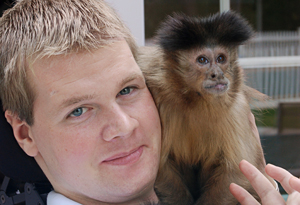Kasey to the Rescue: The Remarkable Story of a Monkey and a Miracle

Photo: Courtesy of Ellen Rogers
In this excerpt from her book, Ellen Rogers explains how a trained capuchin saved her son's sanity, and
maybe his life.
I consider myself something of a tragedy snob. Having lived through some pretty terrible losses, I'm not easily undone. When I was 24, I got married in a hospital sunroom down the hall from the surgical ward where my father fought for a few last months of life. My husband, Ted Sullivan, was diagnosed with cancer when our daughter Megan was 2 and I was pregnant with our second child, Ned. Our little family soldiered on through Ted's grueling treatment and the long, sad hospice days before his death. When Megan was 4 and Ned 18 months, their father, my husband, was gone.
A second marriage brought two beautiful stepdaughters, Kerry and Mindy, plus my three youngest: Jake, Maddie, and Anna Kokos. But our blended family unraveled after Mindy died at age 23 of melanoma. That world-rocking loss was followed by a bitter divorce. Somehow I'd managed to get us into a new house, juggling everyone's activities with the demands of my business. Things were looking up. The younger kids were doing well in school. Ned was thriving as a senior at the University of Arizona, and we had all been rewarded with the joy of Megan's wedding to true-blue cop Ron Holsinger. A miracle of modern love and a high-flying trapeze act of daily logistics, the Rogers-Sullivan-Kokos-Holsinger family was doing okay.
And then the phone call.
"Are you Edward Sullivan's mother?"
Something about the way she said it. I could tell our world was about to fall apart.
"Your son's been in an accident."
Extensive injuries. Condition grave. Come immediately.
Walking into the ICU late that night, after two insanely tight flights from my home in Boston to the hospital in Tucson, I expected the spiderweb of tubes and IV lines. The apparatus of life support was nothing new to me, so I figured I was prepared for what was to come. But when I saw the medieval torture device that encompassed Ned's head, I had to steady myself on the bed rail.
"What...what is that thing?"
"It's called a halo," said the nurse. "They put it on in surgery to secure his head to his neck."
I damn near fainted.
The doctors delivered the news: "Major brain trauma, C1-C2 fractures, shearing... There can be no expectation of functional recovery with a devastating injury like this."
Devastating. The word hit like a wrecking ball: to overwhelm...to render desolate...to lay waste. I listened and nodded, but I couldn't accept it.
Not for Ned. Not my son.
Ned was strong and fit, a lifelong athlete, and one of the most motivated people I knew. As a kid, he'd driven us crazy with his collection of hoo-rah! inspirational sayings.
"Mom," he once admonished when he found me watching Project Runway instead of unpacking groceries. "Procrastination is the thief of time!"
Now, seeing him so damaged, I scrolled through my memory, searching for something from his catalog of wise sayings that approached the gravity of this situation.
I reached through the halo and stroked Ned's stubbled cheek.
"Winston Churchill," I whispered. "When you're going through hell...keep going."
High-risk surgery was required to secure Ned's head to his spine. His body was so compromised that he might not survive the operation. "What would you do if this were your son?" I asked one of the doctors.
"I'd fly him back to Boston for the surgery to be near his family. He'll need all your support. Then I'd get him to a spinal cord injury specialty hospital like the Shepherd Center in Atlanta as fast as I could."
A few weeks later, I was face-to-face with the surgeon at Massachusetts General Hospital. "It went well," he told me in the exhausted post-op hours. "He's stable. Doing as well as we could have expected."
"Thank God," I said and released a breath. "So now...what?"
"Now we watch and wait," he said.
My least favorite mandate. I'm neither a watcher nor a waiter. My response to any situation is Do something.
I spent every day at the hospital, and when I left at night I told myself that Ned was in the care of the best doctors and nurses, that he was not alone. But I knew better. Ned was utterly alone. This man who would forever be my little boy was adrift in the dark—unable to speak or move or breathe—one blink for yes and two for no was all he had. My boy—my articulate, charming, "I can do anything" boy—couldn't even say anything.
Eventually the swelling from the injury and the surgery began to recede. Ned tried to mouth a few words when he had the strength, but the movement was so minimal, it was impossible to read his lips. The effort was excruciating, so we developed an alphabet card system where I'd run a finger across the letters until he blinked a "stop" signal, then start over again, running a finger to the next letter, spelling out brief, stilted messages:
M...O...M...
"I'm here, Ned. I'm here."
H...U...R...T...B...A...D...
"I love you, Ned. We all love you."
H...E...L...P.



